#reflecting as a coping mechanism
Explore tagged Tumblr posts
Text
For the final day: hsday/birthday party @413countdown
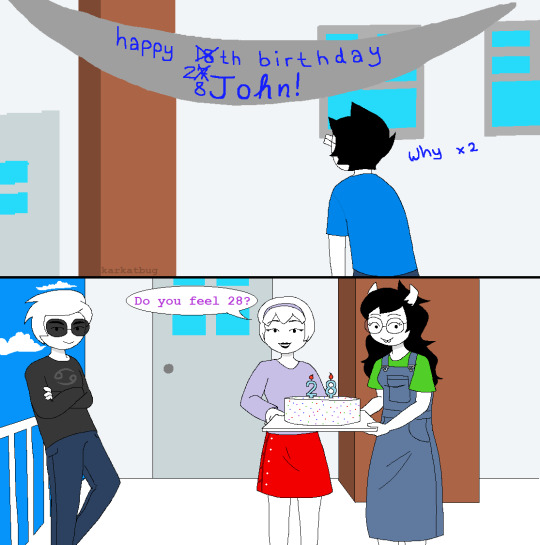
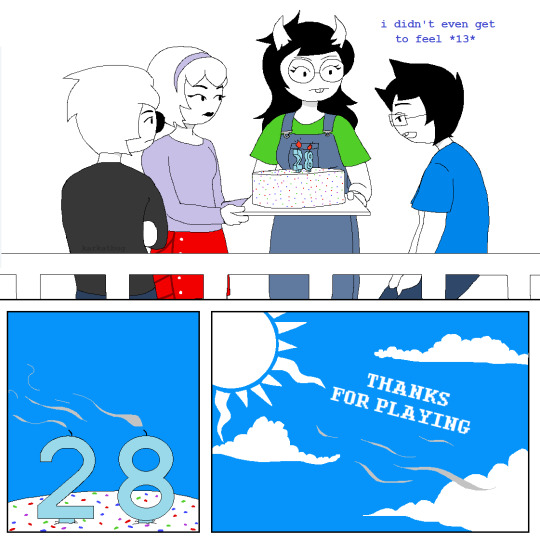
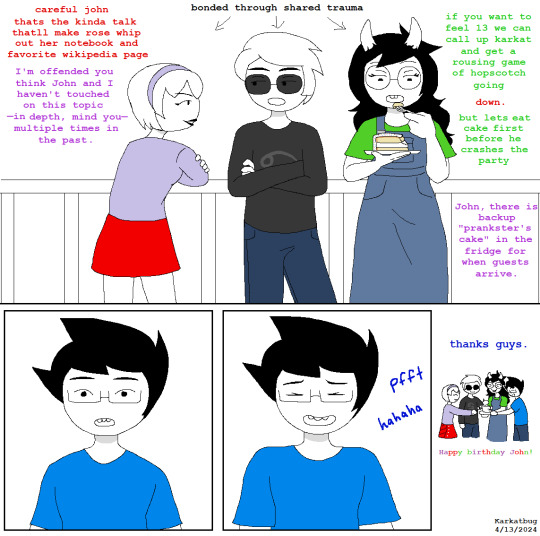
HAPPY HOMESTUCK DAY!
And happy birthday, John! The older you get, the less you want to celebrate, but that's why your friends are here ♥
4/13/2023 || 4/13/2024
#it's always sad thinking back#reflecting on what you couldn't have or the things you lost along the way#buts its okay john#youre not alone :)#homestuck#homestuck413#john egbert#dave strider#rose lalonde#jade harley#hsfanart#my art#also im a big fan of the hc that they use humor as a coping mechanism instead of going to therapy LOL#but anyways hbd john ily
631 notes
·
View notes
Text
"why couldn't shuro have just been honest about what he felt with laios and falin it's not that hard" are you. are you White
#dungeon meshi#shuro#toshiro nakamoto#look you can hate him for other things but this is very clearly a case of cultures (& personalities influenced by these cultures) clashing#shuro is japanese/east asian-coded and laios is european white boy#i am not japanese but i also come from a collectivistic society#pakikisama is a filipino value both prized and abhorred#it relies heavily on being able to read social cues and prior knowledge of societal norms#shuro being from a different country/culture is important to his character#his repressed nature is meant to contrast with laios' open one like that's the point#they both had similar upbringings but different coping mechanisms#shuro explicitly admits that he's jealous of laios being able to live life sincerely#anyway the point is they were operating on different expectations entirely and neither had healthy enough communication skills#to hash things out before they got too bad#re his attraction to falin i personally believe he unfortunately mpdg-ed her#she represented something new & different. a fresh drink of water for his parched repressed self#alas not meant to be#i'll be honest the way ryoko kui handles both fantasy & regular racism in dm is more miss than hit for me#i don't doubt that a lot of the shuro hate is based off of marcille's pov of him#marcille famously racist 😭#characters' racist views don't often get (too) challenged#practically everyone is casually racist at some point#anyway. again if you're gonna hate shuro at least hate him for being complicit in human trafficking & slavery#he couldn't help falling for the wrong woman goddamn 😭#calemonsito notes#edit: upon further reflection i take back what i said about toshiro mpdg-ing falin!#i'm sorry toshiro 😭
253 notes
·
View notes
Text
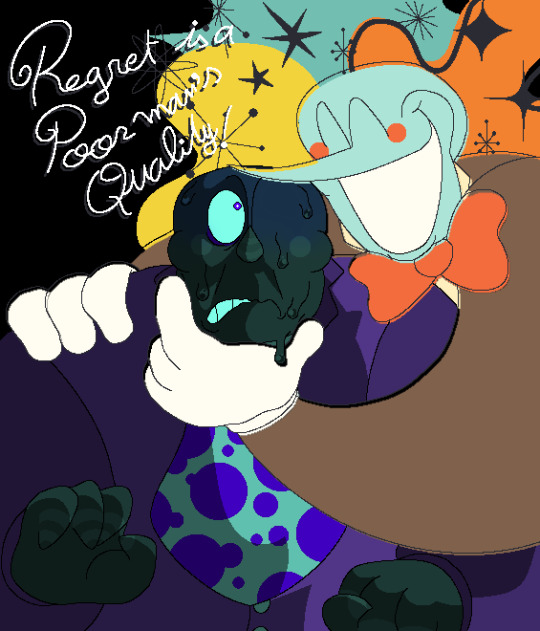
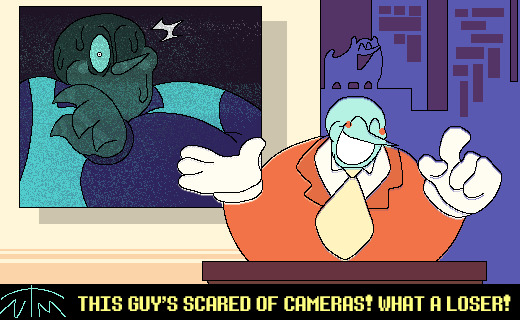




nightmare and his stupid mascot that is basically him but with even less redeeming qualities.
#I really like that one trope where villains argue with their reflection and then smash the mirror at some point.#nightmare 100% would do that. although his reflection is also his mascot that is plastered on all of his products and city-#-so it's pretty much inescapable.#the mascot isn't actually sentient or anything. nightmare is hallucinating or dreaming it.#edit: it's not 3am anymore my thoughts are finally coherent and I can add stuff :3#what the mascot represent is nightmare's outer facade. the sanitized and simplified version of nightmare that he shows the world.#it's all of his bad habits and morals and whatnot personified. everytime nightmare starts feeling guilty-#-that thing appears and tells him to suppress it.#all of that is imaginary. nobody is telling nightmare to suppress his feelings but nightmare himself.#just that nightmare isn't very fond of taking blame.#it makes sense for him to make up an imaginary culprit to put the blame on for even his terrible coping mechanisms.#I'm not sure if I should give the mascot a name. something like ntm™ maybe.#nightmare sans#HOME#sans au#undertale au#utmv#🖍️
42 notes
·
View notes
Text
me when richeh's arc is really about learning that she’s safe now. she’s safe to try new things and learn and grow because she isn’t being forced into it. her sense of self is no longer under threat - her individuality is supported and she is loved for who she is. she doesn’t have to close herself off to outside influence out of the fear of losing who she is anymore. she will still be herself even as she learns and grows because nobody is trying to change her or hurt her. oh my god
#also that the things that keep you safe when you're in an abusive environment can work to your detriment when you're in a safe and healthy-#-environment#me when her arc is about trauma#and this is also reflected in riliphin's arc and how this is something he's learning much more slowly and in a way he's ashamed of#they both have the coping mechanisms they used to survive abuse#richeh is closed off to anything she believes could make her 'not herself'#and riliphin put away parts of himself :(#these kids make me so sad#witch hat atelier#wha#tongari boushi no atelier#atelier of witch hat#richeh#riliphin#richeh witch hat atelier#riche
23 notes
·
View notes
Text

porky minch my beloved, i hate you, youre so beautiful, i want to kill you with a metal pipe,
#porky minch#mother 3#earthbound#theres a lot of symbolism in this design here#for example the abundance of angelic wings to contradict claus's more demon-like wings#and his soft colors once again contradicting claus#hes very obsessed with vanity or his own appearance (as a coping mechanism) so i made his outfit a little over the top to reflect that#idk i could go on and on about my porky hcs and everything he represents so if any of yall are interested lemme know and ill make a post
38 notes
·
View notes
Text
Okay guys so I know we all lightly tease Charles for seemingly never actually thinking through any of the emotions he ever has but it occurred to me, what if he has alexithymia?!? Between his very obvious ADHD and his apparent lack of ever addressing how he feels, alexithymia would explain a lot actually. I mean even in hell he's saying he needs more time to process how he feels and basically wants to NOT have to think about it in the moment on the stairs. Like that boy has alexithymia. He needs his reflective time Edwin, give him time.
Also also like he never wants to talk about himself, only address other's needs and feelings which is just so alexithymia?? I mean I know it's partly his trauma response but also it's such an alexithymia personality trait too. Alexithymia makes every choice he makes make sooooo much more sense. That and the adhd impulsivity, but it didn't really feel like it was the whole picture. Alexithymia was the missing key
#ive come to this realization and now it is final no one can convince me otherwise#Charles my alexithymia best boy <3#i think he TOTALLY has alexithymia so he needs separate reflective time to understand his emotions#but also he likes to live in the moment and does NOT want to reflect ever if he can help it no thank you that's usually a painful experience#so essentially he never even knows what the hell he feels because of his alexithymia and trauma coping mechanism working against eachother#no WONDER the boy has no fucking clue how he feels#just going through afterlife straight “oh well”ing his nervous system#i love this boy so goddamn much#Charles' adhd and alexithymia are holding hands. Charles' alexithymia and trauma are THROWING hands. that is all you need to know about him#well that and his bisexuality obviously we cant forget that#anyway#dead boy detectives#charles rowland#dead boy detective agency#dbda
50 notes
·
View notes
Text
Grieving What You Cannot Touch
I’ve always found it strange how we’re taught to grieve for tangible losses—a person, a place, a thing—but never for the intangible. Nobody tells you how to mourn the parts of yourself you’ve outgrown, or the life you thought you’d have, or the innocence that quietly slipped away when you weren’t paying attention. It’s an ache without a name, a grief that doesn’t fit into tidy boxes like funerals or goodbyes. And yet, it lingers, just as heavy, just as real.
I feel like that type of grief is often closely related to nostalgia. Or rather that nostalgia is, amongst other things, the experience of grieving the past. But it’s not just about longing for what was—it’s about grieving what never was. The version of your life that didn’t come to pass, the connections you hoped for but never formed. For me, it’s the emotional relationship I never had with the male members of my family, particularly my father.
Growing up, I never experienced the father-daughter bond I’d see in movies or hear about from friends. My dad was always emotionally unavailable—distant in a way I couldn’t name as a child but felt keenly in the space between us. I’ve recently learned that when I was 2 or 3 years old, he was in and out of the hospital due to his cancer. During those formative years, my world revolved around my mom, not my dad. And as I piece these things together as an adult, I can’t help but wonder how those early days shaped me. Did I subconsciously decide, even as a toddler, that I couldn’t rely on male figures for emotional connection? Did I carry that into my relationships later on?
The grief here isn’t just for the past; it’s for the ripple effects it has in the present. I grieve the father I wish I had, the kind of dad who would have taught me how to trust male figures, how to feel secure in their presence. But I also grieve the way that absence shaped me into someone who still struggles with those connections today. It’s not a straightforward pain. It’s layered with love, disappointment, and a quiet understanding that sometimes people can’t give you what you need—not because they don’t care, but because they didn’t know how.
This kind of grief is tricky because it’s not rooted in a single event or moment. It’s a slow, quiet loss that stretches across years, shaping you in ways you don’t realize until you look back. And when you do, it’s not just sadness you feel—it’s a mix of everything: anger, longing, confusion, acceptance. You grieve what you didn’t have, what you didn’t know to ask for, and what you’ll never fully get back.
And yet, in grieving, there’s also clarity. There’s a sense of giving yourself permission to name the loss, even if it feels abstract. To say, “This mattered. This hurt. And I’m allowed to feel it.” Because mourning isn’t just about closure—it’s about honouring the weight of what was missing, even if it can’t be replaced.
But how do you fix something so… floating? Something so abstract and unfathomable for a lot of people. How do I tell people I grieve the loving father-daughter relationship I never had? People respond, “I’m sorry for your loss,” and it feels comforting, until I realise they assume my father is gone. But I’m not talking about the physical presence of my dad. I’m talking about the absence of a loving connection between us.
How do you grieve something that technically exists but doesn’t feel whole? It’s not a loss in the traditional sense—it’s not someone who passed away or a relationship that was severed. It’s something more elusive: the absence of what could have been, of what you needed but didn’t receive. It’s mourning potential. It’s grieving love that never bloomed in the ways you hoped it would.
I’ve tried to explain this to others before, and it’s always met with a kind of confusion. People are quick to console when they think you’ve lost someone physically. They know how to respond when grief has a name and a date. But when you tell them, “I’m grieving a bond that was never there,” they don’t know what to say. It’s like trying to describe the shape of an empty space, a void that only you can see.
And maybe that’s what makes this kind of grief so isolating. It’s hard to articulate, hard to validate, even to yourself. You start to question whether it’s fair to feel this way. After all, my dad was there, right? He worked hard, he provided for us, he was present in the ways he knew how to be. So why does it still feel like something is missing? Why does it hurt so much to see other father-daughter relationships filled with warmth and emotional closeness?
That’s the thing about intangible grief—it doesn’t adhere to logic. You can’t reason your way out of it. It lingers, sneaking into quiet moments, catching you off guard when you least expect it. It’s in the way your heart aches during Father’s Day commercials or when a friend talks about their dad being their rock. It’s in the little pang of envy you feel when you see those bonds you never had, knowing they represent something you’ll always yearn for.
I’ve also frequently grieved the way my life could have looked if I didn’t have anxiety. If my depression didn’t make me sleep all day to escape the real world. Sleeping At Last once sang “How do I forgive myself for losing so much time?,” and I can’t help but relate so hard it feels like my heart is going to cave in on itself in pain.
How do you cope with such grievances? I wish I knew, but I’m learning that coping doesn’t always mean finding answers. Sometimes, it’s about sitting with the pain and letting it exist without trying to solve it. Grieving intangible losses—whether it’s a relationship, a version of yourself, or time you’ll never get back—isn’t something you can fix. It’s something you have to feel, piece by piece, day by day.
For me, part of coping has been allowing myself to mourn without guilt. To acknowledge that these feelings are valid, even if they don’t fit into the conventional mold of loss. I remind myself that grief isn’t a competition—it doesn’t have to be “big enough” or visible to others to matter. It matters because it matters to me.
I also try to focus on what I can rebuild, even if it’s just in small ways. I might never get the father-daughter relationship I longed for, but I can work on fostering meaningful connections with others. I can let myself feel the hurt without letting it harden me. I can remind myself that grieving isn’t about staying stuck in the past—it’s about making peace with it so I can carry it differently.
As for the time lost to anxiety and depression, I try to show myself the same compassion I would offer a friend. It’s easy to blame myself for the days spent hiding under the covers or the moments I missed because I was too overwhelmed to participate in life. But blaming myself doesn’t change the past—it only adds to the weight I’m already carrying. Instead, I try to focus on the moments I can reclaim, even if they’re small. A walk outside, a conversation with a friend, a little step forward.
I think that’s the hardest part about grieving intangible losses: the fact that there’s no closure, no finality. It’s a process, not a destination. It’s messy and nonlinear, and some days it feels like you’re back at the beginning. But even in those moments, there’s a kind of resilience in simply continuing. In saying, “I’m still here, and I’m still trying.”
And maybe that’s enough. Maybe grief doesn’t need to be fixed or resolved—it just needs to be acknowledged. To hold space for what was, what wasn’t, and what still could be. Because in that space, there’s room for healing. There’s room for growth. And maybe, just maybe, there’s room for hope too.
#grieving what you never had#grief#healing#self reflection#mental health#emotional growth#coping mechanisms#self compassion#emotional healing#mental health awareness#loss#personal growth#healing process#nonlinear healing#nostalgia#mourning#finding closure#resilience#inner peace#life lessons#writing#reflection
15 notes
·
View notes
Text
my fave form of what's basically friends to lovers is when two people meet and have all their own baggage and the connection they form together and love they have for each other forces them to unpack all that baggage if they want to make things work. the kind of relationship where you're forced to look in the mirror and stop avoiding ur own problems because that person forces u to confront all of them (and u force them to confront theirs, too) because the relationship will Not work if you keep up all these walls either from your person of interest or even from urself!!! and there's too much of something there to give up and move on because it's difficult
the kind of thing where there's romance but the real plot of it all is self transformation through loving another. like the focus is on two individuals w/ their own lives who come together and have romantic feelings for each other vs the romance itself being the plot.
and maybe in the end they don't even stay together! maybe it doesn't work out! but there's drastic change and an undeniable impact they both made in each other's lives that will live on. is changing for the better not love in its rawest form?
#( 💭 faun thinks )#this idea has been sitting in my brain for a while and i randomly got the urge to talk about it again#when i write romance this is usually how i do it <3#i love when characters are forced to deal w/ their baggage and unhealthy coping mechanisms because they love someone enough to#put in that effort#or if not that then the connection makes them realize where they're screwing themselves over so they can acknowledge and fix it#Characters. being forced to Think. to Self Reflect. to acknowledge things they're buried about themselves.#i love it#one example would be like. when someone usually runs away from deep connections but is forced to confront that fear because they get#attached enough to someone to genuinely not want to lose them or to genuinely not want to hurt them if they themselves refuse to acknowledg#how much they genuinely care for them on a personal level#stuff like that!!!!!!!! like yes bitch reflect on urself so u stop self sabotaging!!!!!!#make deep connections w/ the other characters through acknowledging ur shadow self!!!!!!!#compromise with someone u love when ur opposing baggages create conflict!!!!!!!#put in effort and grow as people together!!!!!!!!! learn and evolve with someone else!!!!!!!!#this probably says a lot about me...... and this is probably why i don't really like romance as a genre lol#i like when stuff goes deep and focuses on the characters as individuals instead of purely love interests that end up being rather shallow
24 notes
·
View notes
Text
My thoughts on Skirk
With the way Skirk treats and talks about him, its no wonder Tartaglia turned out the way he did. A bright and naive 13 yr old boy with no combat experience falls away from the comfort of his home into a world full of monsters with no sun or safety and the only psuedo-caretaker he has won't even speak to him properly because she says him as too weak to bother with, and after 3 months of fighting his way through hell and losing his humanity, he returns to that home he was longing for, only to find that 3 days have passed since he left and he tells not a single person what happened to him. No wonder he lost his mind down there.
I miss the Skirk that I had made up in my head, the one I patched together from different fic writer and fan artists ideas for her, the one that had that same rambunctious and bloodthirsty personality that Tartaglia inherited, the one that took care of a child the best she knew how while hardening him to survive the abyss' dangers, the one that at least *tried*, because she *wanted too*.
I just feel disappointed, and I think a lot of other people are as well.
I think that, until we see her again, I'm just going to keep pretending that the one in my head is the real one.
#I was always prepared to have to cope with a dissatisfiying visual design#so much so that I was entirely taken aback by the fact that her character was nothing like I had imagined#i think i just desperately wanted tartaglia to have at least one parental figure who did right by him#begging and crying for pulchinella to be a decentish guy to him#even if he did encourage unhealthy behaviors and coping mechanisms while grooming him into a human weapon as a child soldier#I'm really just projecting here#I used to hate tarts the way a wild animal will attack its own reflection in a mirror#Tartaglia#Childe#Skirk#genshin impact#rant#genshin#genshin skirk#genshin tartagalia#genshin childe
99 notes
·
View notes
Text
nothing good comes out of remembering yjh telling kdj that he didnt have a companion during his 3rd round in a futile attempt to get kdj to open up about his true feelings just for yjh to be the only one who still remembers kdj in the very next arc
#peak cinema moment is divorce arc kdj reflecting on the fact that his coping mechanism of treating yjh as a fictional character who once was#his dad / bro / oldest friend is bringing harm to them only for yjh to end up as his actual blood brother during kaizenix 😭#orv#joongdok
76 notes
·
View notes
Text
ok i was gonna post a video but tumblr wont let me: here are the results of the nuzlocke
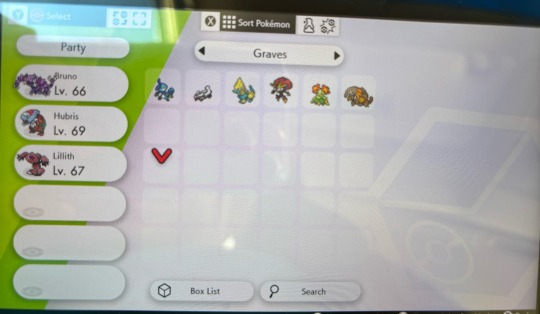
leon swept half of my team with haxorus, he landed two critical outrages on molly and then mango, and then pango took the fall while i was attempting to heal bruno.
i was genuinely so scared i was going to lose the nuzlocke here, because he still had five pokemon and i only had my three left, and one of them had already been weakened. but we pulled through!! i had bruno set up a double toxic spikes so all of leons pokemon were badly poisoned from the start, and before he went down, mango set up a reflect that lasted for most of the battle. once his full restores were used up, it was a waiting game at worst. the rest of my team wore him down until hubris two-shot charizard!
im sad that i lost everyone from the original team. but im happy that mango at least got his swan song during the eternatus fight, and i wouldnt have defeated leon without his help. im glad that (barring dusty bc i put him back in home) the original team is together again at least. im proud of my guys <3
this was the most emotionally attached i got to a mainline pokemon game in a while i think. getting emotional over a game i used to firmly dislike wasnt on my 2025 bingo card.
#i think a nuzlocke was exactly what i needed to get emotionally invested again tbh i was making hcs all over again#like lillith and bruno having a rivalry and mango/pango being married#molly being hubris’s confidant and closest friend in this new world in a haphazard body. even though it was scared of her at first#mango and molly not liking each other in the original team and feeling so torn up about being the only survivors#(i think mango took it extremely hard bc it started wirh him and kiwi while molly was more of a casual player who planned on leaving later)#(so mango accused molly of not caring about the run bc her coping mechanism was to not reflect on it and keep looking forewards…)#lillith being the ghost of someone who died in the original darkest day…#man i wanna design these guys. idk if i will bc im still eh abt art#tbh bruno might uh. get retconned out and ill pretend its another drapion to keep ppl from being confused#but i did have fun seeing this as an au bruno that didnt have all that other baggage#echoed voice#shield nuzlocke
7 notes
·
View notes
Text
Love getting that "world domination" conversation with Astarion.
Astarion: "I mean - I assume there's some device controlling these things, so we find that, murder some people, and... Look, I'm not a 'details' person, all right? But turning up and causing chaos has worked for us so far. I'm just saying that there's an opportunity before us. If we can control the tadpoles, we can keep ourselves safe and enjoy a little world domination on the side. You can't fell me that doesn't sound fun." Durge: "It does sound fun..." Astarion: "I knew I was right about you. It's so good to find a kindred spirit."
Also that bit at the start that goes "we're kindred spirits, what with our love of violence - but also maybe be a bit more subtle and stop leaving dead bodies around the house."
Durge wonders why it feels like they've had a slightly better planned version of this conversation before. Particularly the "murder and violence good, but be more subtle" bits. (And you had them at "murder some people".) And Astarion is literally conspiring with one of the people from Moonrise who controlled it all right now. I actually specialised him as an enchanter for the vampire-esque hypnotic gaze in my build-a-vampire plan, but I'm adding this to the list of coincidences that support my silly diviner headcanon.
They are ridiculous. And they'll only get worse when Minthara is in the party to join the "do crime, conquer the world" club.
#Vel's going to get to Act 3 meet Gortash; look at Astarion; look at Gortash again and go: “oh no.”#His type is bastards who think aspirations of tyranny is a valid coping mechanism - this does not reflect on him or his daddy issues At All#playthrough shenanigans#babbling#/astarion#/durge#petty murder boyfriends
38 notes
·
View notes
Text
Impulsive Behaviors
Impulsive behaviors are actions taken without forethought or consideration of the potential consequences. They can manifest in various ways, including spontaneous decisions, risky behaviors, or emotional outbursts. Here are key points to understand:
1. **Definition**: Impulsivity involves acting on a whim, often driven by immediate emotions or desires rather than rational thought.
2. **Causes**: It can stem from various factors, including neurological conditions, mental health disorders (like ADHD or bipolar disorder), stress, or substance use.
3. **Types**: Common impulsive behaviors include substance abuse, gambling, reckless driving, or engaging in unsafe sexual practices.
4. **Effects**: Impulsive actions can lead to negative consequences in personal relationships, financial stability, and overall mental health.
5. **Management**: Strategies to manage impulsive behavior include mindfulness practices, cognitive-behavioral therapy (CBT), developing coping skills, and seeking professional help when needed.
6. **Prevention**: Building self-awareness, setting clear goals, and creating an environment that minimizes triggers can help reduce impulsivity.
Understanding impulsive behaviors can lead to better self-management and healthier decision-making. If you or someone you know struggles with impulsivity, consider consulting a mental health professional for support.
Impulsive coping mechanisms are ways people react to stress or emotional discomfort without much forethought. These mechanisms can be classified into negative and positive impulsive behaviors:
Positive Impulsive Coping Mechanisms
1. **Physical Activity**: Engaging in spontaneous exercise, such as going for a run, dancing, or joining a fitness class.
2. **Creative Expression**: Impulsively creating art, writing, playing music, or crafting to channel emotions positively.
3. **Mindfulness Practices**: Taking a moment to practice deep breathing, meditation, or yoga to center oneself and reduce stress.
4. **Spontaneous Socializing**: Reaching out to friends or family for an impromptu get-together, fostering connection and support.
5. **Adventure Seeking**: Trying new activities or hobbies on a whim, such as hiking, cooking a new recipe, or attending a workshop.
6. **Laughter and Humor**: Watching a funny movie, sharing jokes, or engaging in playful activities that bring joy and lighten the mood.
7. **Acts of Kindness**: Spontaneously helping someone in need, performing random acts of kindness, or volunteering.
8. **Exploration**: Taking a spontaneous trip to a nearby place or exploring a new neighborhood to break routine.
9. **Journaling**: Writing down thoughts and feelings impulsively to process emotions and gain clarity.
10. **Impulse Buying**: Making small, thoughtful purchases that bring joy or enhance well-being, such as a book or a favorite snack (as long as it’s within budget).
11. **Self-Care Activities**: Impulsively treating oneself to a spa day, taking a long bath, or enjoying a favorite meal as a form of self-care.
12. **Engaging in Hobbies**: Dedicating time to a favorite hobby or interest spontaneously, such as painting, gardening, or playing an instrument.
13. **Nature Immersion**: Going outside for a walk in nature or spending time in a park to refresh the mind and reduce stress.
14. **Mindful Eating**: Choosing to indulge in a healthy snack or meal intuitively, focusing on flavors and enjoyment.
15. **Complimentary Actions**: Impulsively complimenting someone to spread positivity and build connections.
Negative Impulsive Coping Mechanisms
1. **Substance Abuse**: Engaging in the use of drugs or alcohol on a whim, often to escape stress or emotional pain.
2. **Emotional Outbursts**: Reacting with intense emotions such as anger, frustration, or sadness without considering the impact on others.
3. **Risky Sexual Behavior**: Engaging in unprotected sex or multiple partners without considering health risks.
4. **Compulsive Spending**: Making impulsive purchases as a means of coping with emotions, leading to financial issues.
5. **Reckless Driving**: Driving aggressively or engaging in dangerous driving behaviors without regard for safety.
6. **Gambling**: Participating in gambling activities impulsively, often leading to financial loss and addiction.
7. **Self-Harm**: Engaging in behaviors that intentionally cause physical harm to oneself as a way of managing emotional distress.
8. **Eating Disorders**: Impulsive eating behaviors, including binge eating or emotional eating, to cope with feelings.
9. **Social Media Oversharing**: Posting impulsively on social media without considering privacy or the potential consequences.
10. **Procrastination**: Avoiding responsibilities through impulsive distractions or engaging in other activities instead.
11. **Impulsive Travel**: Making spontaneous travel plans without adequate planning, often leading to logistical challenges.
12. **Spontaneous Decisions**: Making quick decisions without thorough consideration, which can affect personal and professional life.
13. **Disregarding Commitments**: Canceling plans or ignoring obligations on a whim, leading to inconsistency in relationships.
14. **Aggressive Behavior**: Reacting to frustration or provocation with aggression, whether verbal or physical.
15. **Attention-Seeking Behaviors**: Engaging in actions solely to gain attention, even if they are inappropriate or harmful.
Understanding both negative and positive impulsive coping mechanisms can help individuals identify their behaviors and seek healthier ways to cope. While some impulsive actions can provide immediate relief, they can also have long-term consequences if not managed properly. Finding a balance and cultivating positive coping strategies can lead to healthier emotional responses and overall well-being. If someone struggles to manage these behaviors, it may be beneficial to seek support from a mental health professional.
#impulsive#impulsive coping mechanisms#coping#coping mechanism#coping methods#negative approach#positive approach#pros and cons#understanding#mental health#mental health advocate#mental health awareness#definition#explanation#explore#behavioral health#positive behavior#negative behavior#let’s talk#conversation#discussion#let’s discuss#self awareness#self therapy#self reflection#know the signs#know the difference#knowledge is power#knowledge#knowledge is healing
7 notes
·
View notes
Text
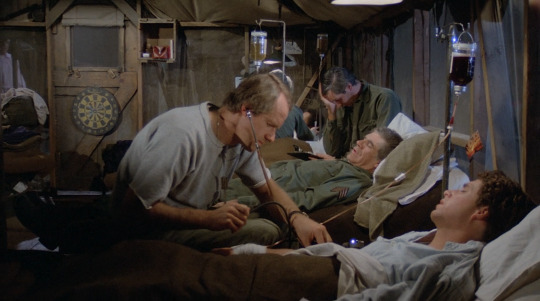
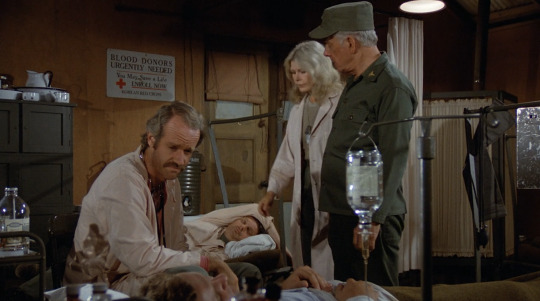
I cannot express to you the emotions that flood me every time we get an episode where Hawkeye is passing out where he sits, but BJ is still managing to truck along.
#this is simply me reflecting on the very specific resiliency coping mechanism that bj seems to have developed via sleep#we are all always on the 'let hawkeye sleep' train because let's be real that man fucking deserves it#but for every 'let hawkeye sleep' there is the countertrain of bj who subsequently does not#and i'm tugging beej's threads and following them to wherever he started learning to shrug off sleep and put his needs absolutely last#no wonder bj gets so pissy so often when he's trying to sleep and he gets woken up#bj hunnicutt#hawkeye pierce#m*a*s*h#mashposting#mashblogging#s6e19#your hit parade#s8e9#mr and mrs who
46 notes
·
View notes
Text

#jujutsu kaisen#gojo satoru#geto suguru#painposting.org#been having a depressive episode and relating a lil too much to geto lately#they're reflecting my coping mechanisms a little too well#depression memes
52 notes
·
View notes
Text
After watching the Netflix show Baby Reindeer, I found myself wrestling with difficult emotions. It helped me recognize that the behavior portrayed in the show is termed trauma bonding. This realization shed light on my own experiences, particularly what happened to me in 2022/2023 with the person who sexually assaulted me during a first date. It’s worth noting that months before I went out with him, he seemed to constantly appear wherever I went in my neighborhood, leading me to question whether it was all just a coincidence. Looking back and considering what I’ve since learned about him, it’s clear that there may have been ulterior motives behind his presence. I’ve come to realize that I don’t believe in coincidences, especially after everything that happened.
Reflecting on the unsettling dynamics of my past encounters with him, one particular incident stands out vividly in my memory. After one of my attempts to break off contact with him, he unexpectedly appeared at my door three months later while delivering food. He knew there are only two restaurants that I order from. I wasn’t aware that he had started working at one of them, and seeing him brought back waves of fear and discomfort. Despite my shock at his sudden appearance, I found myself frozen, unable to react, pretending as if everything was normal. He started crying and asked me why I had ignored and blocked him, further intensifying my feelings of confusion and discomfort. His sudden appearance caught me completely off guard.
I never reported him to the police because I wasn’t sure if it was seen as harassment and sexual assault and was too ashamed because I froze during the assault. When I got myself tested after the assault, I even lied to the doctor about the reason for the test. I also never shared this experience with anyone, and when I tried to talk about it with one of my friends, his response was unsupportive. It made me feel invalidated and silenced, preventing me from opening up about the full extent of what had really happened. My other friend was often too busy and had a tendency to label her friends based on whether or not they were ‘drama-free.’ Feeling unsure of how she would react, I hesitated to confide in her as well. I also considered telling my mom since she knew I went on a date with him when it happened, but I held back. Her tendency to become verbally aggressive and use such information against me left me feeling unable to share the truth with her. During one of the breathwork sessions I did in March, I allowed myself to cry and grieve about the assault and all that happened around it. I felt like I grieved a part of me that died in that awful experience. However, despite this emotional release, I still couldn’t bring myself to talk about it when we were sharing afterwards. Perhaps it was because of shame and fear of being misunderstood. Writing about it here feels somewhat as a relief, and hopefully, in a way, it helps others with similar experiences.
After struggling with the emotional aftermath of the assault and struggling to find support from those around me, I found myself resorting to smoking weed every night before bed as a means to numb my emotions and ignore the reality of what had happened. Understanding this dynamic has provided valuable insight into my own journey. Quitting weed 111 days ago was a significant step for me, and the serendipitous discovery of this timing today fills me with surprise and affirmation, strengthening my resolve to quit and my decision to write about it. It turned out to be one of the best decisions I’ve made, and perhaps I wouldn’t have come to this point of realization if I hadn’t. I can now work on forgiving myself and letting go of the self-blame, understanding that freezing during the assault was a common reaction to the overwhelming situation.
Whenever he contacted me, I acted like nothing had happened. It took me over a year and a lot of dark secrets of his that I had found out to break things off for good with him. Looking back, I realize in how much danger I actually was – his brother is arrested and is a first-degree murder suspect, and he himself is suffering from mental issues as a war veteran and has a case against him for rape and assault. When I froze during the assault, it may have saved my life. Things could have gotten so much worse had I resisted. As I continue on my journey of healing, I hold onto the hope that I will never have to cross paths with him or endure his presence again.
Reflecting on the complexities of trauma, upbringing, and conditioning, and their profound impact on our behavior, I am reminded of the interconnectedness of these past experiences. It’s through understanding and acknowledging these layers of past traumas and conditioning that we can begin to unravel their effects on our thoughts, emotions, and behaviors. By looking into the root causes and patterns that have shaped our responses, we gain insight into the ways in which past experiences continue to influence our present lives. This process forms the foundation for healing and growth, empowering us to navigate challenges with resilience and compassion for ourselves and others.
#personal#my writing#self reflection#healing#trauma#stalking#conditioning#shame#safety#breathwork#grief#people pleasing#coping mechanism#defense#fawn response#fight flight freeze fawn#freeze#behavior#emotions#psychology#baby reindeer#netflix#280424#0424#290424
10 notes
·
View notes